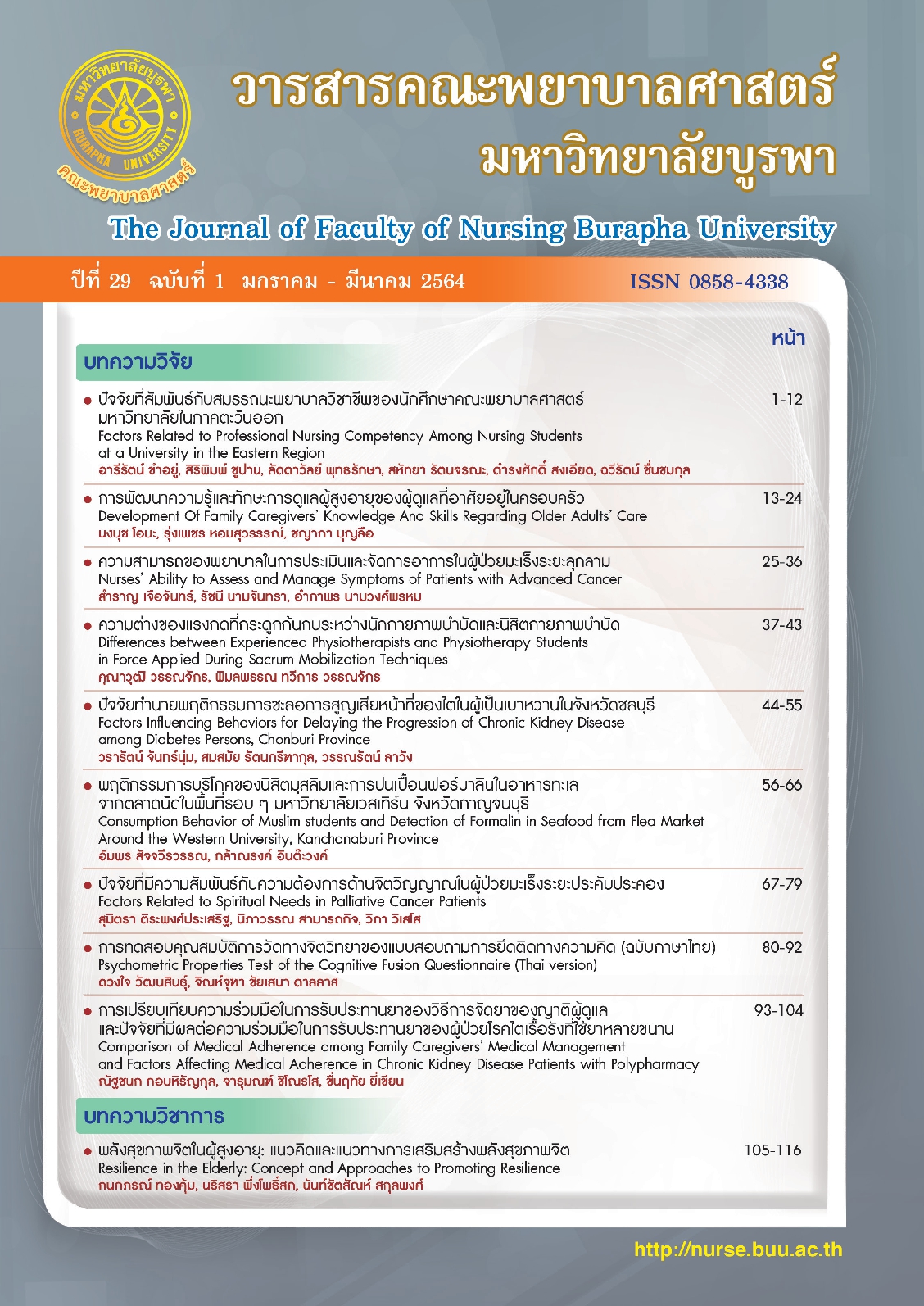พลังสุขภาพจิตในผู้สูงอายุ: แนวคิดและแนวทางการเสริมสร้างพลังสุขภาพจิต
คำสำคัญ:
พลังสุขภาพจิต, แนวคิดและการเสริมสร้าง, ผู้สูงอายบทคัดย่อ
พลังสุขภาพจิตเป็นความสามารถของบุคคลในการเผชิญกับความทุกข์ยากในชีวิต โดยใช้คุณลักษณะ 3 ประการ
ได้แก่ “ฉันมี” เป็นการสนับสนุนจากภายนอก “ฉันเป็น” เป็นความเข้มแข็งภายใน “ฉันสามารถ” เป็นทักษะจัดการปัญหา
และสัมพันธภาพ ปัจจุบันมีผู้ใช้แนวคิดนี้ในการพัฒนาผู้สูงอายุ เพื่อให้ผู้สูงอายุสามารถปรับตัวและฟื้นตัวในเชิงบวก
เมื่อเผชิญกับเหตุการณ์วิกฤตในชีวิต เช่น การเป็นโรคเรื้อรัง การสูญเสียบุคคลอันเป็นที่รัก หรือการสูญเสียบทบาทหน้าที่
ทางสังคม สิ่งเหล่านี้ทำให้ผู้สูงอายุมีปัญหาทางด้านจิตใจ เช่น มีความรู้สึกโดดเดี่ยว สูญเสียความมั่นใจในตนเอง เครียด
ซึมเศร้า ผลจากการทบทวนวรรณกรรมพบแนวทางการเสริมสร้างพลังสุขภาพจิตของผู้สูงอายุ โดยการเสริมสร้าง
ความมั่นคงทางจิตใจและอารมณ์ การฝึกทักษะการเผชิญปัญหาและแก้ไขปัญหา การสนับสนุนทางสังคม และการส่งเสริม
พฤติกรรมสุขภาพที่ดี โดยพบความสัมพันธ์ระหว่างพลังสุขภาพจิตกับตัวแปรผลลัพธ์ที่สำคัญ เช่น ความพึงพอใจในชีวิต
การมีสุขภาวะที่ดี การมีภาวะซึมเศร้าลดลง การเสริมสร้างพลังสุขภาพจิตในผู้สูงอายุจะช่วยให้ผู้สูงอายุมีพลังสุขภาพจิต
สูงขึ้น สามารถดำเนินชีวิตต่อไปได้อย่างปกติสุข จุดมุ่งหมายของบทความนี้เพื่อส่งเสริมความเข้าใจความหมายและ
องค์ประกอบของพลังสุขภาพจิตในผู้สูงอายุ มีแนวทางในการเสริมสร้างพลังสุขภาพจิตของผู้สูงอายุ เพื่อตอบสนอง
ยุทธศาสตร์ด้านการส่งเสริมผู้สูงอายุไทยในการพัฒนาคุณภาพชีวิตให้ดียิ่งขึ้น
เอกสารอ้างอิง
https://studentsuccess.unc.edu/files/2015/08/The-Road-to-Resiliency.pdf
Bureau of Mental Health Academic affairs. (2020). Turn bad into good: RQ Mental Health.
Bangkok: Beyond publishing co.,Ltd. [In Thai]
Chmitorz, A., Kunzler, A., Helmreich, I., Tüscher, O., Kalisch, R., Kubiak, T., ... & Lieb, K. (2018).
Intervention studies to foster resilience–A systematic review and proposal for a
resilience framework in future intervention studies. Clinical Psychology Review, 59,
78-100.
Choowattanapakorn, T., Aléx, L., Lundman, B., Norberg, A., & Nygren, B. (2010). Resilience
among women and men aged 60 years and over in Sweden and in Thailand. Nursing
and Health Sciences, 12(3), 329-335. Available from https://doi.org/10.1111/j.1442- 2018.2010.00534.
Gooding, P. A., Hurst, A., Johnson, J., & Tarrier, N. (2012). Psychological resilience in young
and older adults. International Journal of Geriatric Psychiatry, 27(3), 262-270.
Grotberg, E. H. (1995). The International Resilience Project: Research and Application.
Reports- Research. University of Alabama at Birmingham: Civitan International
Research Center.
Hassani, P., Izadi-Avanji, F. S., Rakhshan, M., & Majd, H. A. (2017). A phenomenological study
on resilience of the elderly suffering from chronic disease: a qualitative study.
Psychology Research and Behavior Management, 10, 59-67.
Huisman, M., Klokgieters, S. S., & Beekman, A. T. F. (2017). Successful ageing, depression and
resilience research; a call for a priori approaches to investigations of resilience.
Epidemiology and Psychiatric Sciences, 26(6), 574-578.
Jeste, D. V., Savla, G. N., Thompson, W. K., Vahia, I. V., Glorioso, D. K., Martin, A. V. S., ... &
Depp, C. A. (2013). Association between older age and more successful aging: critical
role of resilience and depression. American Journal of Psychiatry, 170(2), 188-196.
Koolnaphadol, P. & Haenjohn, J. (2015). The study and development of resilience in the
elderly by integrating the participation process of the family and society networks.
Complete research report, Burapha University. [In Thai]
Lima, G. S., Souza, I. M. O., Storti, L. B., Silva, M. M. D. J., Kusumota, L., & Marques, S. (2019).
Resilience, quality of life and symptoms of depression among elderlies receiving
outpatient care. Revista Latino-Americana de Enfermagem, 27: e3212.
MacLeod, S., Musich, S., Hawkins, K., Alsgaard, K., & Wicker, E. R. (2016). The impact of
resilience among older adults. Geriatric Nursing, 37(4), 266-272.
Maneerat, S. (2011). Development and phychometric evaluation of Thai Elderly resilience
scale. Doctor of Philosophy, Nursing (International Program), Prince of Songkla
University.
Maneerat, S., Isaramalai, S., & Jantiya, S. (2018). A Guide to Promote Elderly Resilience:
A Perspective from Thai Context. Asian Journal of Humanities and Social Studies, 6(6),
201-204.
Phadungyam, M. & Duvall, A. C. (2018). Rehabilitation Strategies for Resilience Quotient in the
Elderly. Journal of The Royal Thai Army Nurses, 19(1), 66-73. [In Thai]
Sangon, S., Nintachan, P., & Thaweekoon, T. (2018). Resilience and depression of people in a
community in Pathumthani province. The Journal of Psychiatric Nursing and Mental
Health, 32(2), 84-99. [In Thai]
Southwick, S. M., Bonanno, G. A., Masten, A. S., Panter-Brick, C., & Yehuda, R. (2014).
Resilience definitions, theory, and challenges: Interdisciplinary perspectives. European
Journal of Psychotraumatology, 5(1), 25338.
Trivedi, R. B., Bosworth, H. B., & Jackson, G. L. (2011). Resilience in chronic illness.
In Resilience in aging (pp. 181-197). Springer, New York, NY. http://DOI 10.1007/978-1-
4419-0232-0_12
Ungar, M. (2011). The social ecology of resilience: Addressing contextual and cultural
ambiguity of a nascent construct. American Journal of Orthopsychiatry, 81(1), 1-17.
Wagnild, G. & Young, H. M. (1993). Development and psychometric evaluation of the
Resilience Scale. Journal of Nursing Measurement, 1(2), 165–178.





